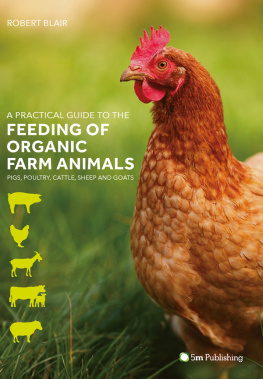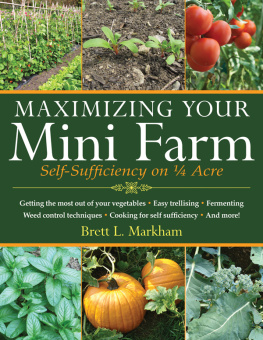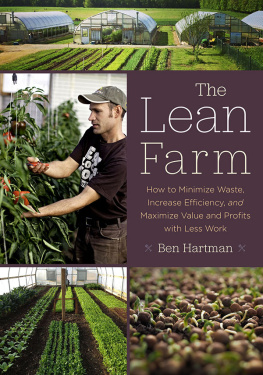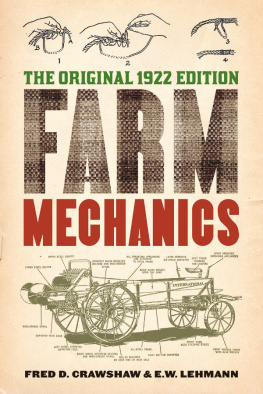THE
FARMING LADDER
by
G. HENDERSON
Oh, little valley, all our own,
Here is the place where beauty dwells,
And all the joys this world has shown
Your gift of quietness excels,
Nor would I change your stream and trees
For jewels of the Seven Seas.

A GENERAL VIEW OF THE FARM
PREFACE
The object of writing this book is to demonstrate how a happy, secure, and useful life may be spent, on what were a few barren acres, without the toil and drudgery which are usually associated with smallholding, and that a financial return may be obtained comparable with that in any other business. The methods used, none of which are clever or original, will show that in peacetime depression or in wartime prosperity the creative work of the farmer can have its just reward, independent of tariffs and subsidies, if directed on the right lines; that great capital, special knowledge or skill are not essential, only energy, patience, and a thorough grasp of the underlying principles.
The great spate of books which have been written on agricultural reconstruction after the war, of which the author has only read the reviews, all seem dependent on some drastic action by the Government, Agricultural Committees, or some special body created for the purpose, and always at the expense of the community at large; while here I try to show that the real solution lies in the hands of the individual farmer, who only requires the time, space, and faith, which should be the birthright of all free people.
This is the plain unvarnished story of a farm and the people who have worked on it over a period of twenty years. In it will be found none of the fine writing or sentimentality about farming which is the prerogative of other writers. If it helps others to make a success of their farming it will be well justified. It is written at the suggestion of visitors to the farm, and is the outcome of an article in the Farmer and Stockbreeder describing the farm and the methods used, refuting the suggestion that the future of British farming lies in big farms. This article resulted in over two hundred letters requesting further particulars.
One note of warning. There is a farming ladder for all who can make use of it, but remember that it is a ladder and not an escalator; it must be climbed step by step and one must be prepared to take the full weight on each rung. The two feet must be placed firmly on the good earth, or it may be a danger to yourself and to others, and although it may enable you to achieve the heights, you may never reach the top. Beware of the easy, the gaudy, the cheap, the second-hand, and the rotten. Even on our bright and shining ladder there may be times when you have to balance on one rung and reach for the next. If you have faith in yourself and the land there are only two rungs you need fear, ill health and accident. Once started you will find others on the ladder too, some above and some below: give them all a helping hand, but avoid those who expect you to drag them up and make no effort of their own. Those who would stop you climbing, or shake you off, may well be ignored.
G. HENDERSON
Enstone, Oxford
September 1943
On the occasion that the Farming Ladder is going to press for the fourth impression the author takes the opportunity of thanking the many farmers and others who have written to him in connection with it. That the book has achieved its purpose there can be no doubt, for a great many young people have written to say that it has given them an object and purpose for the future, for it has shown them how they may succeed in the way of life that appeals to them. The author feels that these will be worthy successors to the many old farmers who have also written to him, telling of their own struggles on the Farming Ladder, and against which the record given in this book has been a very humble effort indeed.
While in the past the farm has always been open for inspection by anyone who cared to make an appointment, we have had so many visitors in recent months that we have found that it is no longer possible to show individual visitors round, and we therefore now arrange a visitors day from time to time, particulars of which can be obtained by post, if a stamp is enclosed.
July, 1944
G. HENDERSON
ACKNOWLEDGEMENTS
Acknowledgements are due to the Farmer and Stockbreeder and to the Poultry Farmer for permission to reproduce photographs supplied by them.
CONTENTS
ILLUSTRATIONS
DIAGRAMS
Chapter One
THE FARM
We saw it first twenty years ago, on a cold grey morning, lying in an isolated little valley on the eastern slopes of the Cotswolds; eighty-five acres of poor, stony land, overgrown hedges, tumbledown buildings, arable a mass of weeds, and grassland, if such it could be called, full of little bushes, or rushes in the wetter parts.
Six miles from a railway station, well off a road over a swampy piece of common land, and far from a school or village; such, probably, were the reasons why it was vacant. Yet a careful inspection showed that it had good possibilities. It was compact, lying in a ring fence, with the site of the buildings well placed. The house was small but sound. A fine spring of water bubbled out of the ground, and although sadly trodden in by pigs and cattle, it supplied every field on the farm, and there were geological indications that it had never run dry. It was a healthy soil for stock rearing, stone brash (oolitic limestone), 450 feet above sea-level, with a general slope south, and sheltered by higher hills. Most important of all, THE LANDmost long-suffering of all Mans possessionshad been badly neglected, but not robbed, as the situation prevented the selling-off of all the produce other than on the hoof. We have been told since that on more than one occasion four horses were required to drag out eight sacks of wheat through the swampy common land behind which the farm is situated.
So here was a farm that was secluded, too far from a village for stray cats, stray dogs, and STRAY PEOPLE to be a nuisance. It had a water supply free from pollutionat that time the nearest large village drew its drinking water from a stream which drained two churchyards and six farmyards, with a peculiar flavour and rich colour only appreciated by those reared upon it, who now deplore the tasteless, odourless,-and colourless product which has to be paid for by a water rate! The overgrown hedges could be cut and laid, the ditches scoured and the swamps drained. The buildings could be made sound and adequate by our own labour. A road could be built from stone quarried from the hillside (it took a thousand tons and all our spare time for ten years to make it 660 yards long and capable of taking the heavy traffic now imposed upon it). Above all, the land could be cleaned and made fertile. Everything else was dependent on this in our case, every penny of our resources would be absorbed in taking the farm, all we put on the land would first have to come out of it by the sweat of our brow.
The vendor was not available to show us round this Small Desirable Property as the auctioneers particulars and order-to-view describe it. But the lad he employed was found asleep under a hedge while his two neglected horses stood yoked to a plough. He was pleased to point out the boundaries and give any information required.
The last harvest had yielded about forty quarters of corn. Ten tons of straw and five of hay were available. The roots, such as they were, had been given to a neighbouring farmer to pen off. A few calves were reared, grazed on the common and roadside wastes, and sold as stores. A couple of sows, an odd cow, and a few ducks completed the stock. The last tenant had been there for ten years, was reputed to have come with nothing and gone away with 
Next page









